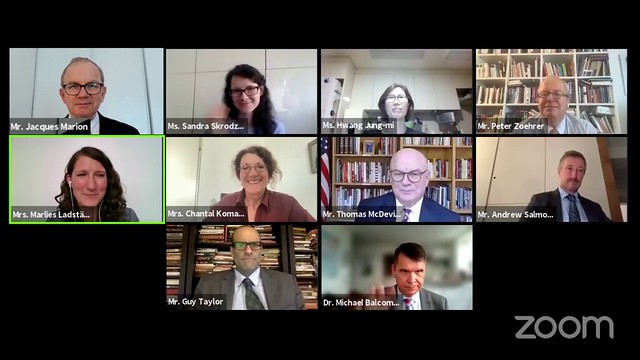Europe and the Middle East—The August 2021 International Leadership Conference concluded with a call for a worldwide spiritual reformation as a prerequisite for world peace.
From August 19 to 21, seven sessions of the ILC were held online under the title “Toward Peaceful Reunification of the Korean Peninsula: Prospects for Economic Development and Peace, and Ideologies, Worldviews, and International Relations.”
The conference concluded on August 21 with a short closing session moderated by Marlies Ladstätter, president of the Austrian chapter of International Association of Youth and Students for Peace (IAYSP) and assistant to the deputy secretary general and the federal commander in charge of the Austrian Red Cross.
Ms. Ladstätter thanked Peter Zoehrer, the Europe-Middle East coordinator of UPF’s International Media Association for Peace and the moderator of the previous session, for the session’s inspiring presentations on the media.
She explained that, together with Europe and the Middle East, the August 2021 International Leadership Conference was held in Korea and Japan, in the Asia-Pacific region, in Africa, and in North and South America. In all these ILCs eminent speakers from various fields of expertise offered enlightenment and hope with their perspectives on the potential for peace on the Korean Peninsula.
Ms. Ladstätter then introduced Dr. Michael Balcomb from the United Kingdom, the regional president for Europe and the Middle East of Family Federation for World Peace and Unification (FFWPU), an organization that is affiliated with UPF.
Dr. Balcomb pointed out that although the speakers had offered many inspiring ideas about how to advance the cause of Korean reunification, they also conveyed that it's not really on anyone's agenda at the moment, not even in South Korea, unlike the wider task of establishing peace in Asia and throughout the world. He then listed three points that caught his attention during the August ILC webinars:
- The need for action, as exemplified in possible grand infrastructure projects, such as the Bering Strait Tunnel or the Japan-Korea Tunnel, the commitment to fight climate change, and the efforts to improve trade and communication.
- The lessons to be learned from efforts made elsewhere in the world—for example, the Channel Tunnel between France and Britain, and the European Union, which brought together nations that historically had been at war.
- The importance of a values-based solution to problems such as family breakdown, the radicalization of youth, violent crime, drug abuse, the refugee problem and more—for which nobody has any real answers.
On the last point, Dr. Balcomb suggested that some of these outcomes could have been avoided in Europe, for example, if the European Union hadn't adopted from the outset an entirely secular approach which disregarded the common spiritual heritage of most European nations, which is a Christian heritage.
He cited UPF co-founder Dr. Hak Ja Han Moon, often called the Mother of Peace, who often has said that the solutions do not lie in human hands alone.
Dr. Balcomb concluded by citing the second secretary-general of the United Nations, Dag Hammarskjöld, who said 50 years ago, just before his untimely death, that he saw no hope for peace without a spiritual reformation.
Marlies Ladstätter then introduced Jacques Marion from France, the UPF co-chair for Europe and the Middle East. After thanking all the panelists of the ILCs of Europe and the Middle East, and other regions, he explained that this third ILC had looked at the possibility of Korean reunification from two angles: the economy and ideology.
He referred to UPF founder Rev. Dr. Sun Myung Moon’s vision of an International Peace Highway linking Japan, Korea and China that would help build what he called an Asian Common Community. Mr. Marion said the ILC panelists convincingly identified the economic and cultural benefits that would result from realizing such an economic community and building undersea tunnels between Japan and Korea and at the Bering Strait between Russia and the United States.
However, these projects and, indeed, ending this division, would require the nations to go beyond their own interests and be guided by the “Headwing” philosophy developed by the UPF founders. This philosophy sometimes is expressed in the principles of interdependence, mutual prosperity and universal values, which have guided UPF’s efforts toward peace and reconciliation on the Korean Peninsula.
In this context, Mr. Marion mentioned the launch on May 9, 2021, of Think Tank 2022, a worldwide alliance of experts who have committed to working toward the goal of peaceful Korean reunification in the coming years.
He concluded by announcing upcoming UPF programs, including the Rally of Hope featuring leading world figures on September 12, and a series of forum discussions with experts from around the world and the Korean media, leading up to a World Summit for Peace in Korea in late 2021 or early 2022.
Marlies Ladstätter closed the session and the August ILC by thanking all the panelists and the audience. She referred everyone to UPF EUME’s website, Vimeo and YouTube channels, and social media accounts (Instagram, Facebook) for reports, recordings, and information on future events.

